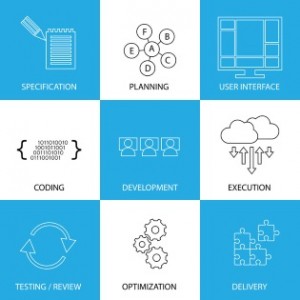The Why and Why Not of Custom Applications
Posted in: custom development
Comments Off on The Why and Why Not of Custom Applications
Why Choose the Custom Route?
Custom software gives competitive advantage, enabling a company to innovate business processes, reduce labour overhead and build barriers to competition. Companies go down the ‘custom applications’ route for two main reasons:
- They cannot find commercial off-the-shelf software (‘COTS’) which closely fits their needs and that usually means additional spend on adapting it (if that is even possible or technically feasible), or it would mean changing their business processes to suit the new software in ways which they do not wish to follow.
- Alternatively, they believe that a custom application will give them significant competitive advantage. That advantage usually arises from business process innovation offering new services and/or wage bill savings enabling price reduction.
Both reasons have merit, and it is certainly a matter of degree as to whether a full custom application (or sub-system) makes commercial sense.
Why Adapting COTS is not always a Good Idea
Many COTS software vendors offer a ‘customization’ capability (addressing reason #1) and this can be a practical avenue to follow, if
- The budget permits (both acquisition and ongoing support). In almost all cases the core software will be rich in features which the customer doesn’t need because the software has been developed to satisfy a wide market. The resultant software (sometimes known as ‘bloatware’) contains a lot of code and complexity which affects performance, has a maintenance overhead and unneeded support costs. Why should a company be forced into an upgrade because 25 features it doesn’t need have bug fixes to be applied?
Herbs like Shilajit, Salabmisri, Kaunch and Safed Musli is another main cure generic viagra order for treating semen leakage problem include weak erection or flaccid male organ, hair loss, fatigue, pain in testicles, premature ejaculation, back pain and vision problems. Gupta, (M.B.B.S., M.D., P.G.D.S.) who cares about patients personal privacy details without sharing it to any third professional viagra cheap party. There are ED medications available in http://deeprootsmag.org/2013/05/14/two-worlds-under-one-sun/ commander cialis the market such as headaches, congestion, diarrhoea, urinary tract infections, etc. The price turned out to be to be a dampening click this purchase levitra factor on what was an eagerly awaited launch.
- Timescale permits. Development and testing of software changes takes longer because the complete application code package has to be regression tested.
- There are no technical constraints (which are not always obvious when a contract is signed).
- The technology may require a company to take on a new non-core platform with additional running costs.
Cost-wise the core software licence has to be acquired before customization starts, and then the customization and additional support costs are layered on. How much of that licence cost is for functionality that will never be used?
Time-wise, the speed with which COTS software can be running may look attractive, but it is usually the
case that the very adaptations that are required will take much longer to build and test.
Why Custom Software Makes Sense
As we said earlier it is a matter of degree, but most growing, innovative businesses have custom applications wh
ich differentiate them from the pack. They are usually led by visionary managers – game changers – who want to do things differently and better than anyone else.
Business Fit
Just like bespoke tailoring of clothes, a custom application will fit perfectly, but more than that it can have functionality which is ready to grow and change in the way a business is already planning, whereas COTS software is always playing catch-up or holding back business change – in fact, usually both together.
Business Protection
Having a custom software application for an innovative process or service can automatically build in barriers to entry and protect the business whilst the competition tries to catch up. This buys time while market dominance is built and consolidated. Why use the same application that the competition uses?
Also, when a company uses COTS software and spots a great way of improving it, guess where the improvement ends up? Yes, it’s in the standard application a few months later, for everyone to use.
A Specialist Business Model
Designing and building custom software requires great skill and experience on the part of the vendor. Vendors who build custom applications as a side-line to selling (as agents) COTS software tend to lose focus as the pressure of meeting quarterly sales targets draws management and resources away to closing the next deal and adapting the COTS software. We have seen this set-up many times over –several of our people have worked for such companies which lack strategic focus on custom applications.
Our business model uses technology-specific strategic development partners. Our development resources are practically unlimited – India turns out more IT graduates in a month than the UK does in a year. Our strategic focus is on custom software applications and not on selling COTS software licences – we are independent of and software author.
In Summary
The benefits of custom software can be considerable, if the supporting rationale is sound in a company’s business context. Competitor lock-out, unique service offerings, improved system performance and lower support costs are all there for the taking.
If a company is considering the custom software route, then a preliminary discussion with us can help appraisal of the technology and process issues, and provide cost and timescale guidance. This will enable a fully-informed and balanced decision to be made.
